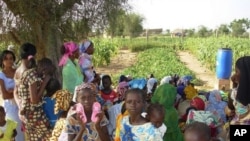In northern Senegal, an innovative farming project is helping Mauritanian refugees grow more food and better integrate into Senegalese society.
It is late in the afternoon and the scorching midday sun is just starting to let up. Mariema Niang walks through her vegetable garden in Wendou Bosseabe, a Mauritanian refugee camp near the Senegal River basin, some 500 kilometers northeast of Dakar.
Sahelian Valley
Niang lists the different types of leafy green produce growing up strong and tall through the dry, brittle soil here in the Sahelian Valley. There are cucumbers, tomatoes, eggplant, okra and watermelon.
Niang, 43, is the president of her gardening group. It is a team of some 100 women, made up of local Senegalese and Mauritanian refugees who fled to Senegal 22 years ago.
In 1989 more than 65,000 black Mauritanians were forced from their homes by ethnic clashes with Mauritanian Moors. One-third of those refugees eventually returned home. But many chose to stay in Senegal.
Niang says they can earn a living here through gardening, which helps longtime refugees integrate as naturalized Senegalese citizens.
Niang says she grew more than enough vegetables for everyone after their first harvest, and they still had left over to sell at the market. The garden has also improved their diet, which is dominated by rice and fish. Niang says they have not yet calculated this year's profits, but she believes it is more than they have ever earned before.
These 18 vegetable gardens in Wendou Bosseabe are part of an agricultural project developed by the French firm JTS Semences. The project includes a kit, with a selection of seeds, soil conditioners, fertilizers, and growing equipment, a manual and five-day training program.
JTS Semences
A JTS garden is capable of growing up to 700 kilograms of produce annually. Harvests are expected to feed a family of 10 with an extra 300 kilograms a year leftover. Sold for 50 cents a kilogram at a local market in Senegal, this can yield an income of around $250 a year - more than enough for Niang to send her five children to school.
Niang says she is happy that she no longer needs to borrow money. At the same time, she says it has helped improved relations with the local Senegalese community because they have a common goal and this gives them a shared sense of pride in their gardening success.
Moda Gueye is director of JTS Semences in Senegal. They have many garden projects in Senegal, but this is the first with refugees.
In the beginning Gueye says the women had some doubts when they saw all the equipment and technique involved, but they learned quickly.
After the first harvest, and some minor setbacks with insects, the gardens produced 200 kilograms of cucumbers and 300 kilograms of okra. This is at least four times more than what they were growing before.
In the Fouta region, the soil is very hard and compact. It requires a lot of tilling before planting. Traditionally, the growing season here is very short - only three months - and the main crops are typically millet and peanuts.
Advantages
Gueye says the main advantages of the JTS gardens are the amount and variety of produce they can produce, and they work on a very small surface area - only 50 square meters. They can also grow year-round and save on water by using a drip irrigation system and underground tarps. Instead of 800 liters a day, the women only use 200.
The overall cost of setting up one JTS garden, including the follow-up visits, is close to $750. Since the projects started in July, the U.N. refugee agency has funded 50 gardens here.
Gueye says the project contributes to social and economic integration. If Mauritanian refugees are going to live in Senegal, there have many needs that must be taken care of, such as health and education. The UNHCR cannot take care of everything, but it can offer them activities, like the gardens, that will help them earn money.
Gueye says it is not her company's intention to follow people for years because then they become too dependent. They are here to give them training and to help for a maximum of one year, but then they will back away and let them do it themselves.
The U.N. refugee agency plans to fund at least another 300 gardens here next year to help women like Mariema Niang commercialize their produce and expand into bigger markets.












